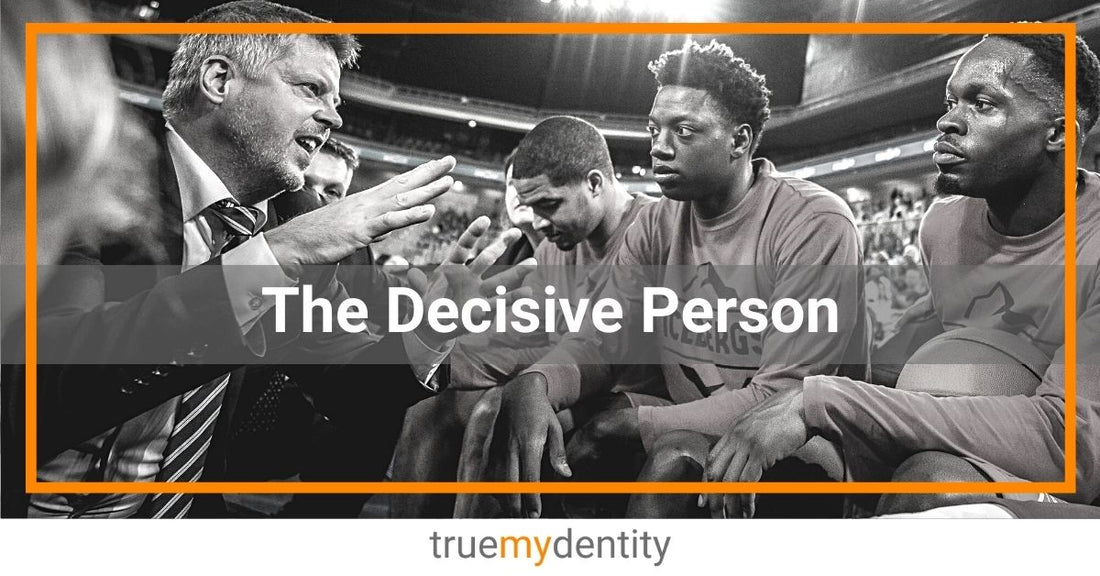
The Decisive Person | Making Decisions | 7 Tips on How to be More Decisive
Luke FeldbruggeShare
The decisive person is the decision maker. One who believes they have some control in the outcome of something; and is willing to gather relevant information, evaluate the options, and decide upon the most appropriate course of action. And when everything is done the decisive person analyzes the results to determine the success of their decision.
Here we cover what it means to be decisive, the positive characteristics of a decisive person, how to make a decision using an effective decision making process, the benefits of being decisive, and we offer seven tips on how to be more decisive when it comes to your own decision making.
What Does it Mean to be Decisive?
Merriam-Webster's DECISIVE definition is: having the power or quality of deciding; resolute, determined; purposeful
True Mydentity prefers to add some spice to that dish.
We are all decision makers, but the decisive person is built a little differently. They are really good at being curious and asking the right questions, evaluating all of the relevant information available, and looking at it from multiple angles to determine what is the best decision and course of action.
Not only that, but they understand that deciding is only half the battle. They are also determined people who see their decision through. They act on it, and upon completion, analyze the results to determine how effective their decision was at solving the issue.
Complete our questionnaire and find out if being decisive is one of your most dominant character traits, and which of the other 58 traits are your most dominant.
11 Positive Characteristics of the Decisive Person
- Brave - The decisive person must be a brave person when faced with the challenging options of a difficult decision. Fear must not stand in the way of making the best decision.
- Confident - The decisive person must be confident in their decisions. They must remain confident they made the best decision they could with the information available, and that they will be able to handle whatever circumstances arise from acting on their decision.
- Curious - Decisive people must be information seekers. They need to be informed to make the best decision based on what they know. Being curious and asking the right questions helps them gain access to relevant information.
- Determined - Decisive people tend to be determined to make a decision, and see the decision through to its conclusion, so they can learn the actual impact of their decision. This process provides insight that may be used or replicated when faced with similar decisions.
- Focused - The decisive person must be focused when evaluating the relevant information used to make a decision. Focused when working to achieve the desired result of their decision, and focused on conducting the appropriate analysis when the outcome of their decision is achieved.
- Motivated - When it comes to making a decision; 50 percent is deciding what to do, and the other 50 percent is doing it.
- Optimistic - The decisive person needs to believe in their decisions, and often will need to convince others to believe in their decisions, so providing an intelligent and optimistic perspective regarding their decisions is an important skill set of decision makers.
- Perceptive - Part of gathering relevant information to make decisions includes gathering feedback, opinions and the perspectives of others who can add valuable insight to the decision making process.
- Responsible - Truly decisive people take full responsibility for their decisions. They own the good and/or the bad that results from their decisions. They will happily take credit for a job well done, and accept responsibility for something that did not go according to plan.
- Steadfast - Decisive people are committed to their decisions. They will perform their duties to the best of their ability and remain firm in their decisions. Unless newly acquired relevant information sheds new light on the situation that requires a fresh look at things to assure the best decision is still being pursued.
- Resilient - The greatest decision makers of all time made decisions that did not turn out well. But, they got up and tried again. Good decision makers know that being a good decision maker does not mean getting it right. It means making the best decision with what you have. And if it doesn’t work out, you try again using what you learned.
How to Make a Decision
Making a good decision requires evaluating multiple options to determine the best course of action to reach a desired outcome. Sometimes that is easier said than done given the weight of the decision. If you’re looking for assistance with how to make a decision, try using the steps below:
Effective Decision Making Process
- DEFINE: Clearly define what decision must be made and the desired outcome.
- COLLECT: Collect information that is relevant to the decision and the outcome.
- IDENTIFY: Identify any new alternative paths of action discovered during your collection of information.
- EVALUATE: Imagine taking each path of action and evaluating each to determine if it meets the requirements and necessary outcome.
- CHOOSE: Choose the most effective alternative, or combination of alternatives, as the best course of action to achieve the desired outcome.
- ACT: Begin implementing the final course of action decided.
- ANALYZE: Review the results of the chosen course of action to determine if your decision achieved the desired outcome identified in step 1.
SOURCE: 7 Steps to Effective Decision Making, UMass Dartmouth
4 Major Factors That Influence Decision Making
- Time - Do you have time and/or are you willing to commit time to the decision? Time is your most valuable resource so use it wisely in your decision making process and really try to understand the amount of time you are deciding upon or committing to, and the value received in return for your time.
- Money - Money is another valuable resource that funds your survival and lifestyle. It will drive some of your decisions. The financial cost of a decision should be considered. Because as you’ve probably heard at some point in your life, it does not grow on trees, and typically costs a significant investment of your personal time to acquire it.
- Emotions - If you feel comfortable or confident, you will likely decide to do it. If you feel concerned, insecure or afraid, you most likely will not. Emotions can help, or hurt, your decision making process.
- Past Experience and Memories - Your brain has spent your entire lifetime deciphering your experiences and has created countless memories from these experiences. To some degree, these have shaped your perceptions of things, and they likely play a big role in the decisions you make.
General Decision Categories
Let’s apply a general categorization of decisions based on their potential duration and overall impact on your health, wellbeing, finances and lifestyle. This provides some guard rails on the importance of a particular decision; and how much attention may be appropriate before the decisive person makes a decision:
- Small Decisions - These are the everyday decisions you are making all the time such as: choosing an outfit, what to eat for lunch, where to get gas, what groceries to buy, when to workout, or where to meet up with friends.
- Medium Decisions - These types of decisions carry much more weight than the small decisions because of their potential impact on your life and wellbeing. But they may not be as long-term or have a significant impact on your finances. They include decisions such as: dating someone, starting a part-time job or new side hustle, taking out a loan to buy a used car.
- Large Decisions - These types of decisions have a much greater and longer-term impact on your survival, health, finances, overall well being and lifestyle. It includes decisions such as getting married, buying a new house, moving away from family or friends, investing in post-secondary education, having children, your career choice; or doing anything intentionally that could damage your body permanently, land you in prison, or kill you.
Benefits of Being Decisive
Being Decisive in Your Learning
Following the decision making process when determining the types of things you want to learn can be extremely helpful. For example, it can help in choosing what career paths you want to learn more about and potentially pursue after high school. It can help you choose what course work or learning opportunities can help refine your professional skills or provide enriched experiences for your career. And we cannot forget to mention, it also can help you decide what types of hobbies, side hustles or extracurricular learning opportunities would be the most enjoyable and beneficial for you to try.
The decision making process can be used for any decision big or small, but when it comes to the things you choose to learn, you’re really choosing what doors of opportunity you want to open. You’re learning everyday, and that learning (chosen or not) expands your opportunities. So when you have the chance to be decisive and choose the types of learning to pursue, choose those that relate to the opportunities you want.
Being Decisive at Work
Being decisive at work begins with setting goals that address top priorities. Don’t be afraid to be aggressive. That said, make sure you understand the culture of your employer and whether they expect every goal to be achieved, or if they prefer you set stretch goals knowing that some may not be met.
Being decisive at work and making the appropriate decisions is only half the battle of making EFFECTIVE decisions. You must take the necessary steps and follow through on the decision to completion to determine whether it was in fact an effective decision. Always act on the decision and analyze the results to learn, so you know what goes into delivering on a decision made, and whether it is worth repeating if the circumstances arise again.
Attempt to take an agile approach to decision making and how you manage your workload. Prioritize your workload by limiting your work in progress, make changes quickly, automate what you can, and focus on innovation.
Being Decisive in Relationships
There are many decisions to make when it comes to participating in a relationship with someone. And at some point, you will find yourself in a position where you will need to make a hard decision; specifically about the relationship. This is where it pays to be decisive; to gather all the information, evaluate all the pros and cons, and make a clear informed decision on where you want the relationship to go.
If you’re currently in a relationship, learning how to make effective joint decisions can bring two people closer together. It allows two people to find common ground on how to approach an issue and solve it. That means working together and striving toward the same goal. That’s a powerful combination for two people who care about each other.
The problem that often gets in the way of making effective joint decisions in a relationship are the different perspectives and beliefs about which decision is the best decision. For two people to be effective joint decision makers there must be mutual respect, appreciation for the other person’s point of view, and a willingness to make slight compromises if it makes the other person happy. As long as there is a “you scratch my back, I’ll scratch yours,” exchange.
7 Tips on How to be More Decisive
Here are seven tips on how to be more decisive when life presents you with options.
- Don’t Sweat the Small Stuff - The small decisions you make everyday are where you can practice making fast, informed decisions. Decide and move on. Do not overthink it. For example, if you choose a blue outfit for the day, but then decide to introduce a purple outfit after the decision was made; and you then debate blue vs. purple for 10 minutes and try on 2-3 modified versions of each outfit; maybe ask yourself if the original blue outfit would have worked. Try not to overthink things. It can be much more efficient and less stressful to stick with a decision without introducing more variables.
- Practice Decision Making Process - It is the most effective way to work through options for those tough decisions. It may not be necessary for the small daily decisions, but the more your practice going through the process the more you will naturally put it into practice for other decisions.
- Be Subjective - Attempt to keep emotions in check and work through the decision making process. Only consider relevant information; known data or documentation. Keep speculation and conjecture to a minimum. If you need time to thoroughly evaluate and analyze the information for those medium and large decisions, take the time you need. Those waiting will need to wait because it’s a decision that may impact your life (and/or the lives of others) fairly significantly.
- Question Fear - Fear is a defense mechanism to keep you out of harm’s way. But, it can also keep you from making sound decisions because you're uncomfortable, nervous, or lacking confidence. The fear of making a “bad decision” can be debilitating and literally keep you from achieving potential success and/or personal fulfillment. Nobody is perfect. It is okay to not know what’s best. Nobody knows what’s best all of the time, so why should you? Making an occasional “bad decision” is how we learn, it helps us grow, to understand more, and build confidence; even though it may be difficult to deal with the repercussions. If the result of the decision does not harm you or others, it may be worth pushing fear aside and making the appropriate decision.
- Seek Information - It is important to accumulate relevant information. Ask questions, get feedback. Find a mastermind group or a group of professionals to meet with, ideally in person, to ask questions and gather insight and perspective. Or, find a mentor to be your go-to for trusted insight.
- Be Confident - Be confident in the decisions you make. You may not know what the end result will be, but be confident in the decision you made and your ability to handle how things turn out regardless of the outcome.
- Be Resilient - You will make “bad decisions”. There’s no way around it. Everybody does. But, what matters more than the decision you made is how you cope with the outcome. Stand back up and take the next step forward. Learning from your decisions; the process of acting on decisions, and the outcome of decisions. This will help you become more confident, wise, empathetic and insightful; and assist you with future decisions.
Bottom line, throughout your life you will make some decisions you are extremely happy with, and you will make a few decisions you will wish you hadn’t. That is one of the gifts and challenges of life and we must be okay with what we decide, accept the responsibility and outcome of our decisions, understand perfection does not exist and realize our decisions help mold us into who we are.
Decisive - True Mydentity Style
True Mydentity offers designs on our clothes that highlight 58 positive character traits. The powerful decisive trait is one of the 58 character traits featured. We believe if you know your dominant positive characteristics, and focus on what you do to learn, work and build relationships using these dominant traits, you will feel more fulfilled and closer to your purpose. And as you improve upon leveraging these positive character traits in those three areas of your life; you move toward discovering your full potential.
Fully leverage the power of your most dominant character traits. If you are a decisive person, proclaim it with True Mydentity apparel; comfortably casual for the authentic and empowered.
VIEW DECISIVE APPAREL COLLECTION >>
Complete the questionnaire and find out which of the 58 traits are your most dominant.




1 comment
I love the image you used at the top of the post. There is no better definition of a decisive individual than a coach!